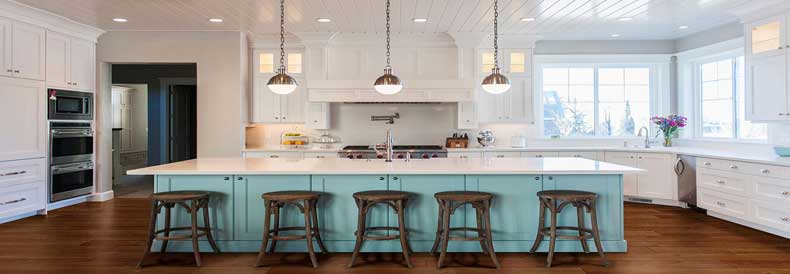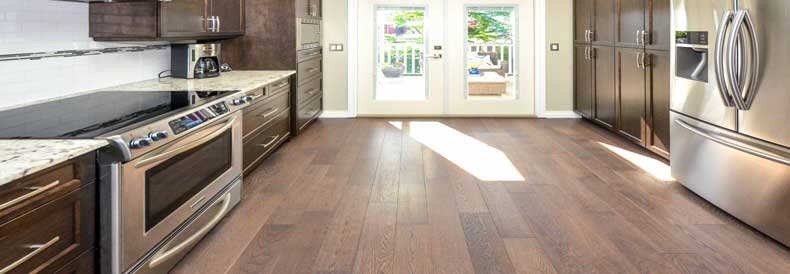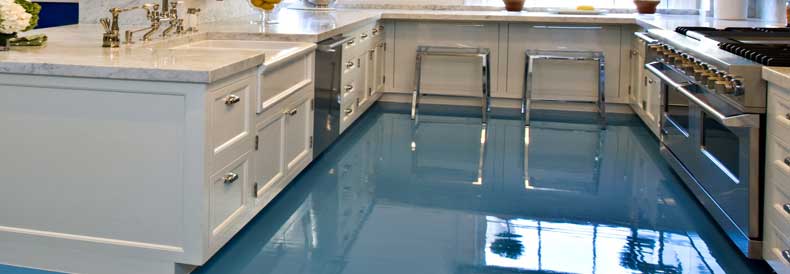Hardwood Floors in the Kitchen:
A Good Idea or a Bad Idea?

Considering installing hardwood flooring in your kitchen? Make sure you weigh your choice carefully. While hardwood floors can improve your home’s value and add natural beauty, they do have downsides to consider.
Pros of Hardwood Floors in the Kitchen

There are many advantages to take into consideration when choosing hardwood as a flooring option for your kitchen. Ahead, let’s take a look at just a handful of reasons why hardwood might be the great new kitchen flooring option for you
Pros of Hardwood Floors in the Kitchen
There are many advantages to take into consideration when choosing hardwood as a flooring option for your kitchen. Ahead, let’s take a look at just a handful of reasons why hardwood might be the great new kitchen flooring option for you.
- It looks great! Available in all sorts of colors, grain patterns and species, there’s definitely a great hardwood floor out there for you.
- It’s incredibly durable and long-lasting. While yes, water can be a huge problem for a hardwood floor, with the potential for any plank to split or become warped, hardwood is still pretty durable, coming in at third place only to concrete and tile. So long as any spill or puddle is quickly cleaned up, there’ll never be an issue.
- Hardwood is very versatile. Wood is definitely one of the more versatile materials of the natural world, and it can definitely look great when applied to any environment in your home. Be it in a rustic setting or in a contemporary setting, there’ll always be a place for hardwood.
- It’s softer and warmer than tile. In terms of texture and feel under foot, hardwood floor is much softer under the foot than tile is. Tile is also much colder than hardwood, as hardwood is able to retain warmth much more efficiently than tile or other similar flooring options.
Cons of Hardwood Flooring in the Kitchen
There’s no doubt that hardwood flooring is a great investment for your home, but that isn’t the whole story. Before installing hardwood in your kitchen, consider the drawbacks.
- It’s not cheap. A lot of work goes into the installation of hardwood floors, especially when it comes to sanding. All that work adds up when it comes to labor costs, not to mention the high cost of the wood itself.
- It can take a lot of work to maintain. Every 10 years or so, hardwood should be sanded and refinished if it’s to keep up its appearance and continue to look its best. Much like the installation itself, this process isn’t cheap, and can take several days to complete.
- It can be quite vulnerable. While a well maintained hardwood floor can last a lifetime, that’s not to say that it still isn’t vulnerable to scratching, denting, and other types of expected wear and tear. If you’ve opted for a softer wood such as pine or fir, then this will be especially true. Also, as mentioned previously, the floors are fairly vulnerable to water. While day-to-day spills will be fine so long as they are cleaned up promptly, larger occurrences such as water leaks or flooding will be an issue and can cause permanent warping.
- There are softer options to reduce fatique in the kitchen. While hardwood floor is certainly softer under the foot than materials such as concrete or tile, it is still harder than other commonly used materials such as linoleum, vinyl, or cork. If it’s a softer floor you’re after, one of these materials may be worth more consideration than hardwood. If you spend a lot of time in the kitchen, a softer floor can help reduce the strain in your back while washing dishes and cooking.
Alternatives to Hardwood in the Kitchen

Don’t want to risk water damage with hardwood flooring in the kitchen? There are many alternatives to consider such as laminate flooring, ceramic tile, or even epoxy flooring, a seamless and nonporous floor system that’s highly resistant to stains, chemicals in food, heat, and abrasion.
